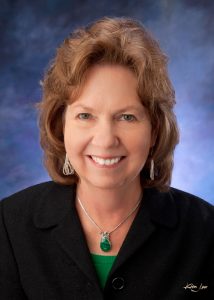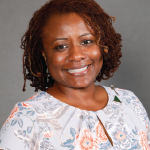This week, long-time ARP member Janet Poole, PhD, OTR/L, FAOTA, becomes the organization’s 51st president. Dr. Poole is a professor and division chief of the occupational therapy graduate program in the School of Medicine at the University of New Mexico, Albuquerque. Her research has focused on scleroderma and other rheumatic diseases, specifically how they impact the ability to perform daily life tasks.

Dr. Janet Poole
Over the years, she has conducted numerous studies examining rehabilitation interventions for patients with scleroderma, co-developed a self-management program called Taking Charge of Systemic Sclerosis (TOSS) and authored several textbook chapters on rehabilitation for people with the disease.
Dr. Poole has been very active in the ARP since joining more than 30 years ago. She has served on the Executive, Practice, Membership, Research and Annual Meeting Planning committees. She was a grant reviewer for the Rheumatology Research Foundation Study Section and ARP liaison to the ACR’s Education and Research committees. The ARP has also recognized her efforts and accomplishments with several awards: Master Clinician (2012), Master Educator (2014) and Distinguished Lecturer (2018).
The Rheumatologist spoke with Dr. Poole about the ARP’s priorities and the challenges and opportunities that lay ahead.
The Rheumatologist (TR): In recent years, the ARP has focused on three key areas: securing more funding for arthritis research, advocating for legislation on regulatory relief and prior authorization reform and attracting more healthcare providers to the field of rheumatology. As ARP president, will you pursue different goals or priorities?
Dr. Poole: I plan to address the workforce shortage by encouraging more health professionals from different disciplines to enter rheumatology. There’s an approaching tsunami of people who are turning 65 years of age. Many of these older adults will develop rheumatic diseases, such as osteoarthritis, osteoporosis and other musculoskeletal conditions. We willl be in an ideal position to continue building our ARP interprofessional membership team by developing educational and other resources and promoting the rheumatology field to nurses, pharmacists, occupational therapists, physical therapists, social workers, nurse practitioners, physician assistants, health educators, practice managers, psychologists and others. They’ll all be needed to manage the health of this influx of older people. As part of this communication, recruiting and education campaign, the ARP has already created flyers that describe benefits of membership to healthcare professionals in different disciplines. Hopefully, within the next several years, our efforts will help boost ARP membership and most importantly, improve the lives of people with rheumatic and musculoskeletal diseases.
TR: What unique skills or experiences do you bring to your new role? How will they help you effectively lead the organization?
Dr. Poole: Knowing an organization’s history—where it’s been and what it’s done—is essential to guiding and leading it forward. I share a long history with the ARP. I have experienced the organization’s changes, supported and participated in many of its past accomplishments and recognize its future potential. I feel fortunate to have been directly involved in all three of its major divisions: the ACR, the ARP and the Rheumatology Research Foundation. All of these experiences, along with my background as an educator and occupational therapist working with people with rheumatic and musculoskeletal diseases, have prepared me to lead the ARP by focusing on its goals and meeting member needs.
TR: What new challenges will the ARP face next year?
Dr. Poole: This is a time of opportunity, not challenges. We understand the need for rheumatic training and must expand and tailor our educational materials and resources to the larger needs of the interprofessional team. Management of people with rheumatic diseases involves more than one discipline because of the complexities of the conditions we deal with. This is our chance to represent and serve the needs of the whole interprofessional team, which is different than organizations that represent one discipline. By adopting a broader focus, we can grow and expand ARP’s membership base to include an even wider variety of healthcare professionals who work with people with rheumatic conditions.
TR: Why do you want to serve as ARP president?
Dr. Poole: One reason I became involved in the organization was because of my interest in scleroderma. At the time, there weren’t many OTs working in this area. But after joining ARP, I discovered there were others like me who specialized in the management of people with scleroderma. Being an ARP member has helped me professionally in terms of networking with healthcare professionals from around the country who treat patients with scleroderma. Serving as president is my way of giving back to the field of rheumatology. I really want to represent the voice of my colleagues and help others similar to how I’ve been helped through networking, educational, mentorship and grant opportunities. I want to provide a clear path for people who want to enter or continue working in the rheumatology field.
TR: Many ACR/ARP members are familiar with Dr. Poole the researcher, academic and occupational therapist, but haven’t met Janet Poole, the individual. What can you tell us about your personal side?
Dr. Poole: Over the past year, I’ve been very excited about two personal events. My son got married this past summer, and my daughter is now working as an OT. I wish she would work in rheumatology. I’ve been dropping hints since her graduation and have even dragged her to a few Scleroderma Foundation conferences.
Meanwhile, I enjoy exercising, which helps clear my head. I walk every day before or after work for two miles around a local golf course and, during the summer months, swim daily for about 30 minutes in my backyard pool. I also like to travel and see sights in small towns, such as the giant pecan in Seguin, Texas; the oil pumpers decorated like longhorns in Post, Texas; and Wild Bill, the fossilized gator in Holbrook, Ariz.
When I walk, I listen to oldies on the radio. I carry a small transistor radio instead of my cell phone because it fits better and is easier to hold in my hand. I guess that’s the OT in me coming out. I’m always seeking ways to help myself and others better manage their everyday activities.
Carol Patton, a freelance writer based in Las Vegas, Nev., writes the Rheum After 5 column for The Rheumatologist.



